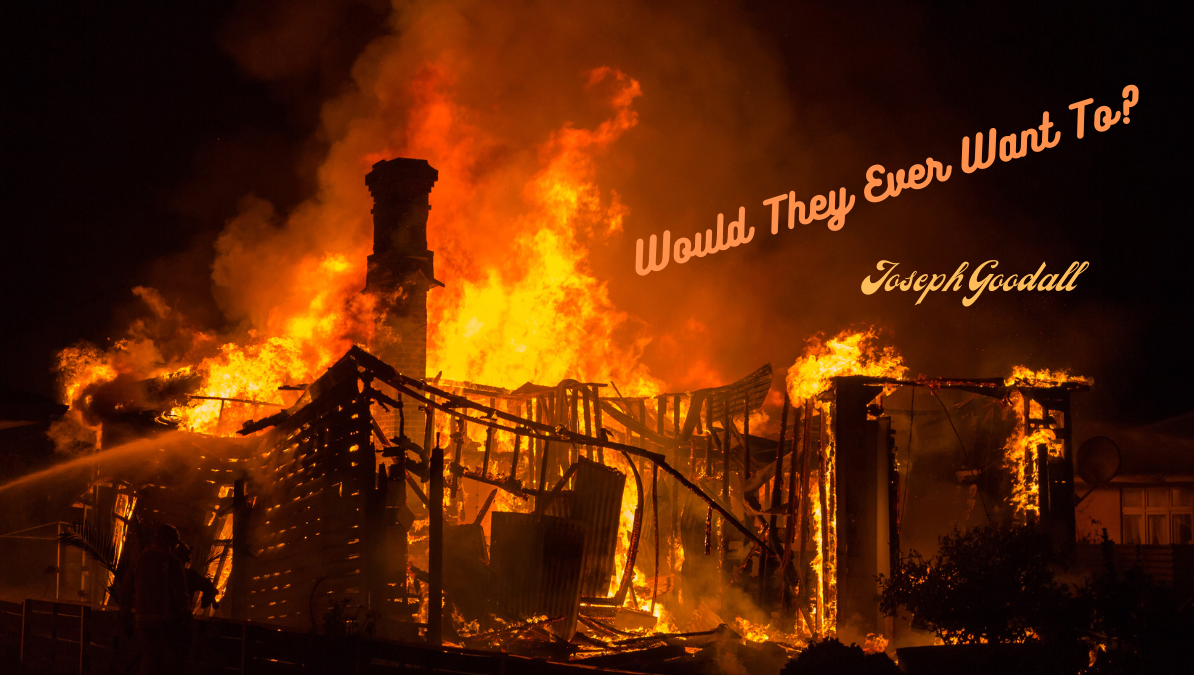Your cart is currently empty!
The walls of the Gunther house rattled as if a herd of cattle was stampeding through their Denver cul-de-sac. The burning sun had not yet shown its face as four pairs of feet scuttled along the wooden floors, running to and from the SUV in the driveway. The parents and two children yanked open drawers and snatched underwear and valuables into duffel bags, went to the fridge and scooped its contents into a suitcase. The television flashed evacuation warnings in the living room, bathing the couch in a red glow. The house hummed and swelled, upset by the change in routine, disturbed from its gradual awakening.
Outside in the valley, usually deep and green and quiet under a vast Colorado sky, the Gunther’s neighbors also loaded up their vehicles at a frenzied pace. The strip of asphalt-covered earth, lined with gabled houses in painted earth tones, was surrounded by a sea of bristly grass. The sloped hills beyond were bleached the color of gritty sand. The early morning air was bitterly dry, and gusts of wind buffeted the sides of the houses like the bellows of a furnace.
In view of the octagon window over the garage door, Mr. and Mrs. Gunther ordered their children into the car with urgent hand motions. Lila was crying with a backpack over her shoulder. Bernie took the steps down from the front door one at a time, the wood and nails squeaking in protest. After a harried shout from their mother, the girls quickened their step and piled into the SUV. Mr. Gunther swung into the road and joined the line of cars headed for the highway.
Inside the Gunther’s house, the beds were left in heaps of twisted sheets, the dresser drawers extended like crooked staircases, and the freezer door was left ajar. Another wave of hot air against the house shook the windows. A flock of birds coming down from the mountain swooped over the neighborhood, and several stopped to rest at the peak of the house’s roof.
We’re on the move. Our nests are gone. The air is parched and dangerous.
The Gunther’s chimney released a puff of smoke. The birds pecked at a dimple in the painted brick chimney and returned to the orange-tinted sky.
The house’s large windows facing the street now reflected empty driveways and hollow garages. With a settling groan, the Gunther’s house focused inward, taking inventory of its rooms, rafters and foundation. Lila and Bernie’s bedrooms were illuminated by nightlights, left-behind stuffed animals lining the walls, homework emptied from school backpacks strewn across the floor. A smiling brown teddy bear sat upright against Lila’s pillow. The gun safe in Mr. and Mrs. Gunther’s closet stood open, their abandoned shoes and clothes scattered lifeless on the floor. The tiled walls of the bathroom were still wet from Mrs. Gunther’s shower, cut short by Mr. Gunther’s insistent announcement that they had to leave.
The house had never been burglarized, but its walls had been stripped and gutted, reallocated and restructured by Mr. Gunther’s ambitious renovations. Their years of habitation included carefully-planned vacations, spring cleaning days, birthday parties, date nights: always a flurry of activity. But now in the wake of this mass exodus, an air of violation, of raw abandonment, hung stagnant in the empty hallways and disheveled rooms.
The basement walls of the house tickled, sensing the rabbits scurrying along their underground burrows in the backyard. With twitching ears, the colony of brown rabbits nuzzled the corner of the house with their noses in farewell. Their eyes darted around the abandoned neighborhood as they scampered down the hill to find shelter.
The sky darkened with smoke; particles of ash collected on the cactus spines along the neighborhood sidewalks. The hum of the television messaging in the living room garbled and then cut out. After a flicker of lights, the electrical wires were sapped of power.
The Gunther’s roof sagged slightly in resignation. From the peak of the metal roof, a lick of orange flames and curtains of smoke were visible on the desolate hills. The raspy wind grew hotter against the back porch. The other houses along the street shifted against the earth but could not leave their roosts like the other fleeing creatures.
The house on the left, where the Vasquez family lived, leaned toward the Gunther’s property.
They’re coming back. . . Certainly they’re coming back. Our people wouldn’t leave us. They always come back.
The house on the right moaned. We cannot be so certain. You see all the waste they pile at the curb every week. Use once, throw away, move on to the next. The Brady family lived in this house, but before that it was the Munsons, and before them the Baxters owned it, but they had let rowdy college students rent out its rooms.
This street is our home. The Gunther’s house relaxed its soffits, the shape of the roof returning to normal. We are home to our families. Think of all the memories we bear.
The well-manicured house contained boxes of blue and white Christmas decorations in the basement, Mr. and Mrs. Gunther’s wedding album and college graduation robes, the remains of Bernie’s pet hamster in the backyard and Lila’s crayon scribbled in the corner of the den next to the lamp.
No, no, I’m being a short-sighted fool, said the Vasquez house. They cannot stop a fire. They value their lives more than our bricks and timber. My foundations are from the rock quarry near the hill. I hold the history of how fire can consume the valley. It happened in the past, before we were built. It will happen again after we are ash in the wind.
And if they could save us, would they even want to? added the Brady house.
The Gunther house remained silent as it considered the scientific books stored on its shelves, the endless information of the internet and streaming documentary shows which passed through its walls.
Be hopeful, my companions, the Gunther house replied. We bear the image of the earth in which we’re rooted. We provide our families shelter, places to celebrate and gather and make love.
Don’t lecture me, you pole barn, the Brady house scoffed. My dwellers tout themselves as activists, but they don’t spend much time in my walls. They’re too busy ferrying across this greedy suburban sprawl in their gas-guzzling metal cages. And look at the Vasquez family – they haven’t painted you or replaced your roof in thirty years. They’re probably banking on the insurance policy payout after the fire consumes us.
With a disastrous crash, a section of the Vasquez roof caved in. A moment later, the basement window shattered and water gushed out into the side lawn.
Our world’s coming to an end. The remaining rafters of the Vasquez house heaved and rattled in despair.
Here, here, my fellow abode. It will be okay. The Gunther house tried to ignore the searing heat of its own roof. My girls live and play within my walls. They care for our neighborhood. I can hear their laughter even now.
The windows of the Brady house shimmered in the approaching blaze. Whatever gets you through. I’ve heard fire devours wood in minutes. We’ll come out as recycled fertilizer for the next hungry tribe of humans to till.
The trio of houses witnessed their companions along the street tremble in fear. The landscape hedges withered in the heat. From beyond the crest of the hill, a crackling cry echoed down the valley and against their wood and brick facades.
The paint on the Gunther’s back deck blistered as a blanket of flames tore across the straw-colored lawn. The fire danced against the back of the houses along the entire street. Violent crackles, pops and hisses accompanied the swirl of fire and smoke.
With a great sigh the Vasquez roof collapsed, fueling the flames with fresh air. The Brady house’s stately gabled face turned upward to the dark gray sky in defiance. Its beams and joists rigid in self-protection, the Gunther house centered its focus on the prized teddy bear still perched on Lila’s bed.
I will survive. I must hold on. Who is my family without their home?
The smoke seeped through the cracks of the house, dense fumes obscuring the appearance of the rooms, consuming the Gunther’s belongings, suffocating the wall cavities, the basement, the attic space . . .
We are descended from the noble lineage of habitations which have sheltered humankind through the eons. We are each a link in the chain . . . where our accommodations fail, more will take their place . . .
At first it was difficult to distinguish the bite of the searing flames from the jet of water. But eventually three or four streams brought a soothing relief around the perimeter of the Gunther’s house. The flames sputtered, gasped for life, lost fuel and died. As the smoke dissipated, the Gunther house noticed a line of red fire trucks forming a barricade along the neighborhood street. Fire fighters hefted thick hoses around each house as they pushed forward against the blaze. The house with wooden siding across the street was visibly relieved, spared the advance of the ravenous flames. The sloped backyard behind the Gunther house was charred black in the wake of the fire. The Brady house was smeared with dark soot. The Vasquez residence on the left was now capped with a flattened assortment of shingles and wood, but its walls were still standing.
A fireman approached the Gunther’s front door, his steel-toed boots plodding across the front porch. He took off his glove and placed a hand against the glass.
There’s no one in here. They’ve left. But thank you for coming, all the same. The Gunther house felt exposed and filthy, like the overturned rocks in its backyard where the girls looked for worms and roly poly bugs on summer evenings.
The fireman motioned to his colleagues to check the other houses on the street. He shouted at the door in warning before entering the Gunther house. A blast of clear air cut into the stagnant fog in the living room. Down the hall, the heavily-clad man peered into the bedrooms, saw the opened drawers and messy bed sheets.
In the last bedroom, there was the small teddy bear, sitting askew on Lila’s pillow in the settling haze. Then came a crackle of static from the walkie on his belt. No sign of life in any of the houses, and the fire was still spreading elsewhere.
Blackened boot marks remained on the carpet as the fireman left.
Joseph R. Goodall is a civil engineer and the author of the short story collection, What the Bird Sees in Flight: Collected Stories of a New Zealand Farming Family. He lives with his wife in Atlanta, GA.


Comment